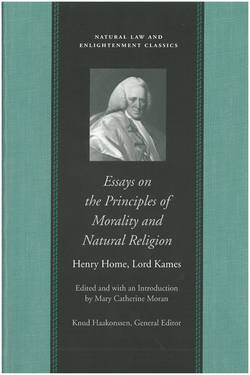Essays on the Principles of Morality and Natural Religion

Реклама. ООО «ЛитРес», ИНН: 7719571260.
Оглавление
Lord Kames (Henry Home). Essays on the Principles of Morality and Natural Religion
Отрывок из книги
ESSAYS ON THE PRINCIPLES
OF MORALITY AND NATURAL RELIGION
.....
Our nature, as far as concerns action, is made up of appetites and passions which move us to act, and of the moral sense by which these appetites and passions are governed. The moral sense is not intended to be the first mover: but it is an excellent second, by the most authoritative of all motives, that of duty. Nature is not so rigid to us her favourite children, as to leave our conduct upon the motive of duty solely. A more masterly and kindly hand is visible in the architecture of man. We are impelled to motion by the very constitution of our nature; and to prevent our being carried too far, or in a wrong direction, conscience is set as at the helm. That such is our nature, may be made evident from induction. Were conscience alone, in any case, to be the sole principle of action, it might be expected to be so in matters of justice, of which we have the strongest sense as our indispensable duty. We find however justice not to be an exception from the general plan. For is not love of justice a principle of action common to all men; and is not affection between parents and children equally so, as well as gratitude, veracity, and every primary virtue? These principles give the first impulse, which is finely seconded by the influence and authority of conscience. It may therefore be safely pronounced, that no action is a duty, to the performance of which we are not prompted by some natural motive or principle. To make such an action our duty, would be to lay down a rule of conduct contrary to our nature; or that has no foundation in our nature. This is a truth little attended to by those who have given us systems of natural laws. No wonder they have gone astray. Let this truth be kept close in view, and it will put an end to many a controversy about these laws. If, for example, it be laid down as a primary law of nature, That we are strictly bound to advance the good of all, regarding our own interest no farther than as it makes a part of the general happiness; we may safely reject such a law, unless it be made appear, that there is a principle of benevolence in man prompting him to pursue the happiness of all. To found this disinterested scheme wholly upon the moral sense, would be a vain attempt. The moral sense, as above observed, is our guide only, not our mover. Approbation or disapprobation of those actions, to which, by some natural principle, we are antecedently directed, is all that can result from it. If it be laid down on the other hand, That we ought to regard ourselves only in all our actions; and that it is folly, if not vice, to concern ourselves for others; such a law can never be admitted, unless upon the supposition that self-love is our only principle of action.
It is probable, that in the following particular, man differs from the brute creation. Brutes are entirely governed by principles of action, which, in them, obtain the name of instincts. They blindly follow their instincts, and are led by that instinct which is strongest for the time. It is meet and fit they should act after this manner, because it is acting according to the whole of their nature. But for man to suffer himself to be led implicitly by instinct or by his principles of action, without check or control, is not acting according to the whole of his nature. He is endued with a moral sense or conscience, to check and control his principles of action, and to instruct him which of them he may indulge, and which of them he ought to restrain. This account of the brute creation is undoubtedly true in the main: whether so in every particular, is of no importance to the present subject, being suggested by way of contrast only, to illustrate the peculiar nature of man.
.....